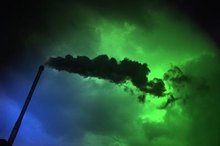What does fact checked mean?
At Healthfully, we strive to deliver objective content that is accurate and up-to-date. Our team periodically reviews articles in order to ensure content quality. The sources cited below consist of evidence from peer-reviewed journals, prominent medical organizations, academic associations, and government data.
The information contained on this site is for informational purposes only, and should not be used as a substitute for the advice of a professional health care provider. Please check with the appropriate physician regarding health questions and concerns. Although we strive to deliver accurate and up-to-date information, no guarantee to that effect is made.
Health Problems Related to Natural Gas Leaks
Natural gas is a fossil fuel 3. It is formed when layers of buried plants and animals are exposed to pressure and heat for thousands of years. Natural gas is primarily composed of methane. Methane is a highly flammable compound. In its purest form, natural gas is colorless and odorless. Gas manufacturing companies add a tinge of warning smell to it that helps in the detection of any natural gas leakage. Although natural gas plays an important role in the automobile industry, where it is extensively used as fuel in vehicles, natural gas leakage can pose serious health problems.
Common Health Problems
Exposure to natural gas through gas leaks can be harmful. It may lead to explosions and pose serious health hazards that are sometimes even fatal. Small gas leaks accumulate over a period of time and add a significant amount of pollutants that stress the immune system and other bodily functions. Gas leaks can cause serious harm to plants, thus affecting the environmental ecosystem as well 13.
- Exposure to natural gas through gas leaks can be harmful.
- Small gas leaks accumulate over a period of time and add a significant amount of pollutants that stress the immune system and other bodily functions.
Asphyxiation
Do Brussel Sprouts Cause Urine to Smell?
Learn More
One of the major health effects of natural gas leakage (or exposure to methane) is asphyxiation. It is a serious health condition where the body is not able to get sufficient oxygen supply, which may lead to loss of consciousness, brain damage and death. People with high chemical sensitivity are more susceptible to this disease.
Effects on Respiratory System
Leakage and subsequent combustion of natural gas releases large amounts of water vapor, ashes, volatile organic compounds and toxic fumes into the atmosphere. These particulates and substances pass through our respiratory system and enter deep into the lungs and body, bringing about respiratory diseases. Also, natural gas is lighter than air and therefore rises up, concentrating nearer to the head. Associated symptoms such as:
- pneumonia
- nausea
- vomiting
- irregular breathing
- memory loss
- fatigue
- sinus pain
- headache are also reported because of the exposure to natural gas leaks in lower concentrations
- Leakage and subsequent combustion of natural gas releases large amounts of water vapor, ashes, volatile organic compounds and toxic fumes into the atmosphere.
- These particulates and substances pass through our respiratory system and enter deep into the lungs and body, bringing about respiratory diseases.
Physiological Effects
Signs You Have Natural Gas on Your Property
Learn More
Methanethiol (methyl mercaptan) or ethanethiol (ethyl mercaptan) is the odorant that is added by the natural gas companies to detect its leakage. When inhaled in sufficient amounts, ethanethiol causes physiological effects such as:
- dizziness
- headache
- vomiting
- shivering
- fever
- unconsciousness
Natural gas may also contain several contaminants like PCBs (polychlorinated biphenyl), benzene, toluene and radon (radon is present in natural gas in its original state). We inhale benzene and toluene during gas leaks. They pose serious health threats. PCBs, benzene and radon are carcinogenic (cancer-causing), whereas toluene may cause reproductive harm.
- Methanethiol (methyl mercaptan) or ethanethiol (ethyl mercaptan) is the odorant that is added by the natural gas companies to detect its leakage.
- PCBs, benzene and radon are carcinogenic (cancer-causing), whereas toluene may cause reproductive harm.
Related Articles
References
Writer Bio
Deyanda Flint has been writing professionally since 2001. Her articles have appeared in “Spigot Science Magazine”. She holds a Master of Arts degree in creative writing from Georgia State University.









